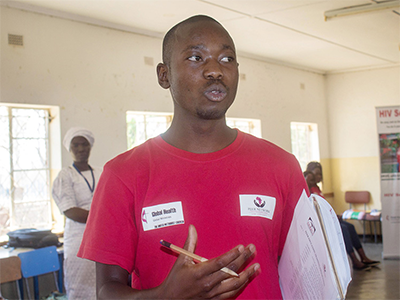Last fall, students at Africa University were able to test themselves for HIV in a place of their choice and then, depending on the test result, take responsibility for their health.
The Africa University HIV Self Testing project — the first to be conducted at a United Methodist institution in the Zimbabwe Episcopal Area — was made possible by the donation of 750 testing kits from OraSure Technologies Pacific Biotech Company. Funding came from the United Methodist Board of Global Ministries through the episcopal area's health board.
Your support of the Africa University Fund apportionment supports the general operating expenses of Africa University including faculty and staff salaries and vital infrastructure.
The project was conducted both to measure and to promote the use of HIV Self Testing kits by students who would not normally get tested by healthcare professionals.
Mandla Tirivavi, the center's program coordinator, said the project goal was primarily to strengthen the university's network of peer educators and their outreach activities, with emphasis on engaging with other young people from the surrounding area.
 |
| Farai Danny Mhlanga is one of the peer educators from Africa University involved in the school's HIV Self Testing project. Photo courtesy of Africa University. |
A team from the Ministry of Health and Child Care trained 28 peer educators, university clinic staff and some nurses from Old Mutare hospital.
A national survey conducted in 2015 revealed that 74 percent of the Zimbabwean population knows their HIV status. However, the biggest gap is in testing of adolescents and young adults.
Through the clinic's program, students were able to get the kit to self-test. Peer educators provided counseling and other support as needed.
"The A.U. peer educators are very vibrant, they were driving the self-testing and also involved in training other peers," said Tirivavi. "Young people speak the same language, face similar challenges and share the same experiences, therefore they were the best people to promote this project."
Over 120 students collected kits, which include a swab, buffer and test tube, in the first two days of the program. Gums are swabbed and the specimen inserted into the test tube where a reactive or non-reactive result is obtained after 20 minutes. If the result is reactive, the student is advised to go to the clinic for a prick test by professionals that will confirm whether or not they have HIV.
"The first two days following the launch of the kits, we were overwhelmed by the high turnout of students who came and collected them. In the past we recorded more students requiring testing when college opened and towards vacations, maybe that is the time they felt they needed to check their status," Murapa said.
Over 375 kits were collected in the first four weeks. When the project officially ended on Oct. 31, 423 kits had been distributed and the remainder will continue to be given to students who want to self-test.
As one of the newest tools in the HIV testing services package, the self-test is expected to play an important role in accelerating progress towards the United Nations goal of 90-90-90 percentage coverage for HIV testing, treatment and viral suppression by 2020.
Eveline Chikwanah, communicator, Zimbabwe East Conference
One of seven apportioned giving opportunities of The United Methodist Church, the Africa University Fund transforms Africa by educating and empowering students from across the continent through Africa University, the first fully accredited, United Methodist-related educational institution on the continent. The Africa University Fund supports the general operating expenses of Africa University including faculty and staff salaries and vital infrastructure. Please encourage your leaders and congregations to support the Africa University Fund at 100 percent.





